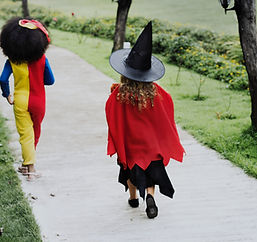Department of Psychology, University of Calgary


DETERMINANTS OF CHILD DEVELOPMENT LAB
The COnversation Canada Articles
Read op-ed pieces by DCDL members in The Conversation Canada.
What to do if your child is struggling: Steps caregivers can take to help kids and teens with their mental health
With child and adolescent mental health problems on the rise, here is a step-by-step guide for caregivers for recognizing signs of mental distress and responding with support and resources.
5 tips for a safe Halloween during COVID-19
Whether you decide to allow your child to trick-or-treat or not, it’s important to plan out how you will talk to them about this decision. Drawing on our expertise in child development and infectious disease, we’re here to help make an informed decision about Halloween this year and provide some tips for communicating your decision to your child effectively. Check out the tips here.
How to help your child cope with returning to school during COVID-19
Every fall, parents are tasked with managing back-to-school transitions. But with COVID-19, the start of this school year feels very different. Our research shows that due to COVID-19, parents and children are experiencing greater levels of anxiety and stress. While levels of anxiety and stress may be high, parents play an influential role in helping children cope, encouraging a positive back-to-school transition and helping to reduce children’s anxiety and worries. Here are some helpful tips!
How parents can support early language skills and a love of reading
Learning to read is one of the most important developmental achievements of childhood, and it sets the stage for later school and life success.
Parents can play a key role in supporting the development of children’s early language skills and fostering a love of reading.
Read more about how parents can help kids learn and love to read.
Teenage sexting linked to increased sexual behaviour, drug use and poor mental health
New research from the DCD Lab in collaboration with Dr. Jeff Temple has found that one in seven teens are sexting and that a link exists between sexting and sexual behaviour, drug use, and poor mental health. What does this mean for education and how can you know the risks for your teen? Read more in this article by Camille Mori, Dr. Temple, and Dr. Madigan.
How failure can help build resilience
With recent news of the college cheating scandal in which parents allegedly paid for their children to gain entrance to post-secondary in the United states, increased attention has been placed on the extreme and even illegal measures parents will take to ensure their children are successful. But does protecting children from failure really benefit them? Read more about this as well as tips on how to build resilience in your child.
What happens when parents play favourites?
Many siblings, when they get together as adults, joke about which child was loved the most. But is it really a joke or is there an edge of truth that still rankles us? Read more about the impact of playing favourites and some tips for being a fairer parent.

Screen time predicts delays in child development
Researchers, doctors, public health officials and parents are all trying to make sense of the impact of screen time on children. In a study published today in JAMA Pediatrics, we find a measurable association between how much young children are using screens and how well they are meeting their developmental milestones. Read more from Dr. Dillon Browne, Dr. Nicole Racine, and Dr. Sheri Madigan.

Technoference: A habit parents should ditch for 2019
“Technoference,” or the intrusions and interruptions of digital devices during social interactions, has important implications for parenting today. It is next to impossible to simultaneously text while also engaging and responding consistently and sensitively to your child’s needs. Read about technoference and some tips to disconnect from devices from Dr. Sheri Madigan, Dr. Dillon Browne, and Rachel Eirich.

How to infuse your family with the spirit of generosity this holiday
Research has shown that a parent's level of generosity and charitable behaviour is linked with their child’s display of the same behaviours. With Christmas fast approaching, it is the perfect time to learn about ways to foster generosity and gratitude in children. Read advice from Dr. Sheri Madigan in this article.

Why should sexting be on the curriculum?
Sexting is emerging as a modern component of youth sexual development. Read about why sexting should be incorporated into the current sexual education curriculum from Dr. Madigan, Dr. Temple, and graduate student, Camille Mori.

How do we keep children safe from sexual encounters online?
How do we keep children safe from online sexual encounters when technology is used so often today? Read advice from Dr. Madigan, Dr. Dimitropoulos, and lab member, Nina Anderson.

Youth Exposure to Online Sexual Content
One in five youth are exposed to unwanted sexual content online. Read more from Dr. Madigan and Dr. Dimitropoulos.

How can we overcome toxic childhood trauma?
Read how compassion can triumph over experiences of childhood trauma in this recent article from Dr. Madigan, Dr. Racine, and Dr. Tough.

Are teens engaging in sexting behvaiours?
Read about recent research from Dr. Madigan and Dr. Temple on common sexting behaviours teens are engaging in and how parents can proactively discuss health and safety behaviours with their teens.

Can siblings make you more empathic?
Read about research from Dr. Madigan, Dr. Jambon, and Dr. Jenkins that shows how having a sibling can make you more empathic toward others.

How can we promote empathy in children?
Dr. Madigan, Dr. Jambon, and Dr. Jenkins provide three tips for how to promote empathy in children.























